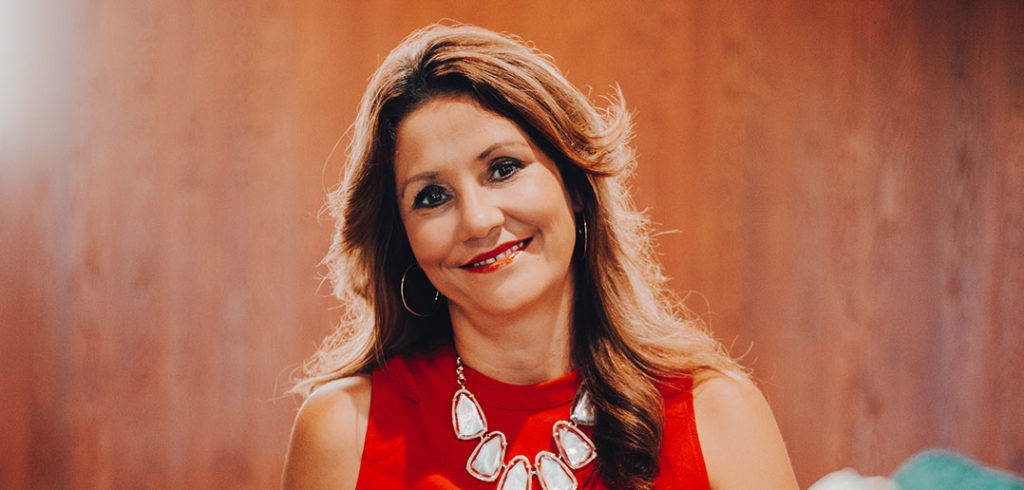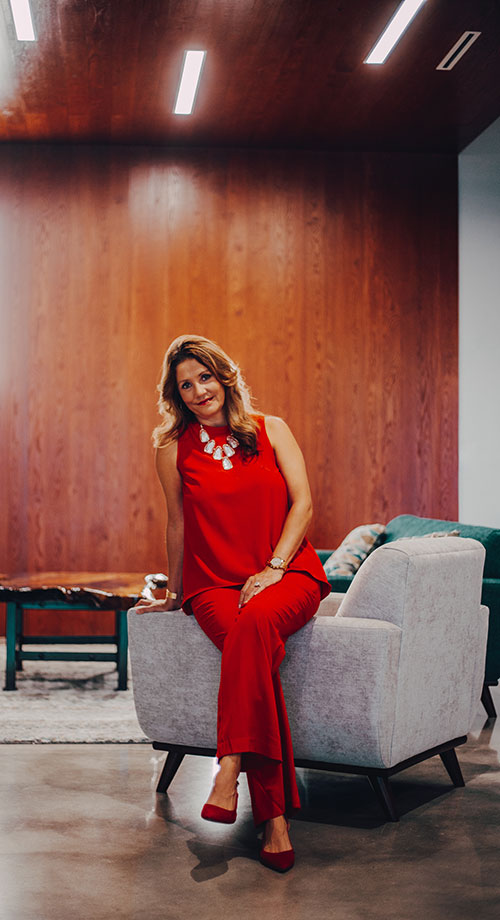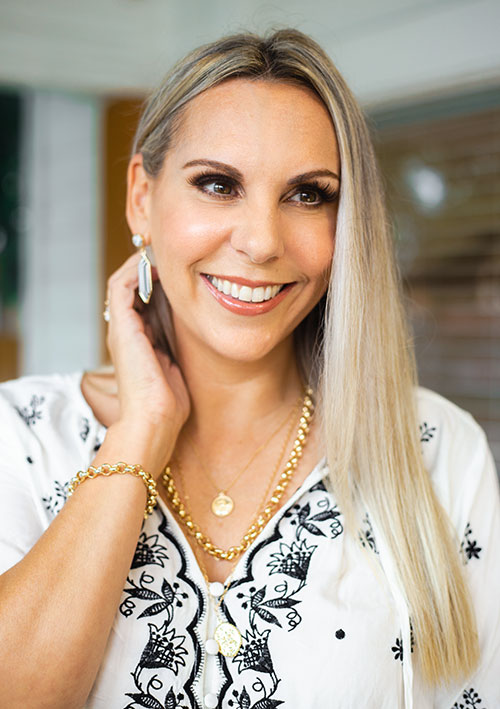Rebecca Contreras and Holly Christine Hayes use their stories to give back to the Austin community and help those who share similar experiences from their respective difficult pasts.
By Sabrina LeBouef, Photos by Kylie Birchfield.

Rebecca Contreras had only ever been on one other plane in her entire life. It was a trip to Mexico with her husband. “First time on a plane ride, first time in the ocean,” Contreras says.
When she touched down after her second-ever flight, she took her very first step on Washington D.C.’s soil. Contreras made the decision to go north five days earlier when she was offered a job in then President George W. Bush’s administration. The task: manage more than 1,200 personnel for the president.
Her husband and kids stayed behind in Austin, just for a short while. Six weeks and they would reunite in Virginia. But for now, she was moving alone.
After landing, Contreras went straight to work. She rented a car for the first time and hit the road toward the transition office downtown near the White House. For about an hour, she circled the building, not knowing she was already at her destination.
“You’ve passed the building 10 times,” said her friend, who was attempting to navigate with Contreras through a flip phone.
The move to D.C. in January 2001 was a stark difference from her move to Austin as a young girl.
Growing up in El Paso, Contreras lived with uncertainty. When she was five years old, her mother went to the grocery store and didn’t return. Contreras, her twin brother and her six-month-old sister were left alone.
“That really did a number on my brain and my own self-esteem, or lack of,” Contreras says.
It didn’t help that at that same age, Contreras was a victim of sexual abuse for the first time.
Contreras’ grandmother was the only stability in her life amid the neglect, abuse and poverty. Yet at nine years old, she was forced to say goodbye to her and El Paso. Contreras’ mom had stopped using drugs and wanted to move to Austin with her children.
“As a young girl who didn’t really have a relationship with her mother, it was a very difficult transition for me,” Contreras says. “My mom had started to get her life on track and tried to make sure she was dealing with her own personal issues, but [for] all intents and purposes, she really didn’t have a strong relationship with any of us.”

In Austin, Contreras began smoking marijuana at age 14. It became a gateway to other drugs. Contreras then moved out of her mom’s house two years later. She got pregnant at 17 and dropped out of high school.
When her daughter was born, Contreras had already moved back into her mom’s place in East Austin. By 19, she was ready to get her life back on track.
“Once I had my daughter, I really understood that I had to do something different with my life and that the nonsense of repeating a cycle in my own family needed to stop for her sake,” Contreras says.
She joined a Spanish church called Templo Sinai and surrounded herself with people who believed in her—faith leaders and pastors. There, she started attending counseling to work through her abuse and suppressed anger.
She also enrolled in the Job Training Partnership Act, created to help single moms trying to get off welfare. The program guided moms through getting their GEDs and training in a specific skill of their choice. After living on welfare her whole life and never holding a job, Contreras set her sights on a new goal.
“If I could just land a secretary job, I would accomplish it all,” Contreras says.
In October 1989, Contreras walked in for her first day of work. She was to answer phones for Anne Richards, who at the time was the state treasurer and running for governor of Texas. This single job kicked off the next 10 years of a career in government that gave Contreras mentors, an education from the Lyndon B. Johnson School of Public Affairs and an opportunity that took her all the way to D.C.
“I really felt like the mission of government was centric to me wanting to do something bigger with my life than just myself,” Contreras says. “I didn’t want to just have a job to have a job. I really felt like I was making a difference.”
After serving in Washington D.C., Contreras moved back to Texas in 2005. Even though she had another job offer for Bush’s second term, her daughter wanted to graduate high school with her friends in Austin, and that was Contreras’ highest priority.
Back in the Lone Star State, Contreras and her husband, who also grew up an inner-city kid in a single-parent home, had a vision. They wanted to help those in the community who were like them growing up. In 2008, their vision manifested as LaunchPad, a nonprofit that provides resources to help disadvantaged youths and underserved families.
The pair started with offering an after-school program at Dobie Middle School to serve students who were truant or dealing with issues like drugs. They worked with the middle school for eight years and served several thousand families before evolving the organization into more of a foundation model. LaunchPad now searches for community projects they want to support. With the pandemic, they recently worked to provide meals for almost 3,000 nurses and doctors.
Contreras is still on the board for LaunchPad, but her main focus has since shifted to AvantGarde LLC, a consulting firm she co-founded in 2011. Her small business consults about 15 government agencies, including some on Capitol Hill.
Similar to her 10 years rising through the ranks in government, Contreras has spent nearly a decade growing her business in stride. Today, AvantGarde LLC has produced more than $15 million in revenue and houses more than 100 employees across Austin, Philadelphia and the Washington D.C. area.
Throughout her career, Contreras has been honored for her accomplishments. She has received the “Women in Enterprise” award from Enterprising Women magazine in January 2020 and was selected for the 2020 “Women 2 Watch” by the Women Presidents’ Organization. Back in 2017, the Austin Business Journal honored Contreras with the “Profiles in Power” award. That same year, Governor Greg Abbott and the Texas Small Business Summit awarded Contreras the “Latina Entrepreneurial Excellence Award.”
Contreras says it’s nice to get the recognition, not because she’s looking for it but because of the potential it has to motivate other Latina business owners. If she can create a booming business without an entrepreneurial background, anybody can.
“We all have struggles and issues that we deal with, so I really believe in sharing my story with as many people as possible,” Contreras says. “I believe that it provides hope and inspiration for others that might be in the same boat or have a different journey.”
This was the case for Maria Hernandez. She met Contreras through LaunchPad in 2008, where Hernandez was working as Dobie Middle School’s dropout prevention specialist.
They both had a lot in common. Hernandez, too, had a troubled childhood. After watching her father murder her mother, she became a ward of the state. As a child, she experienced physical and sexual violence. This was later followed by domestic violence.
By the time she met Contreras, Hernandez was afraid to make eye contact and speak in public. She was a mother to four children while her husband was in jail, so she relied on government assistance to supplement her low teaching wages.
My past doesn't define me. Rebecca Contreras
Contreras began to mentor Hernandez, helping her overcome her fears and raise her self-esteem.
“She helped me be sure of myself and know that I don’t have to stay a victim just because I was a victim of domestic violence,” Hernandez says. “I’m a survivor.”
Contreras eventually encouraged Hernandez to get off government assistance. Step by step, Hernandez worked to get off food stamps, then Medicaid, then Section 8 Housing. With each achievement came a celebratory phone call.
“If it were not for seeing you and hearing your story, I would never think that was possible for me. You inspire me,” Hernandez told Contreras.
Over the years, Contreras has found more appreciation for her story. Now 51 years old, she realizes the importance of stepping away from the grind of her work and dedicating time to sharing her experience with people unsure of how to start their own story.
Contreras knows she didn’t have a great beginning. However, the punches she’s taken have contributed to the tenacity and resolve she holds today.
“My past doesn’t define me,” Contreras says. “It’s an important part of my journey because without my past, Rebecca wouldn’t exist.”

Holly Christine Hayes only started sharing her story roughly around 2015, when she launched Sanctuary Project, a nonprofit to employ survivors of trafficking, addiction and violence.
“It takes a long time to heal enough to be open about some of the things we’ve been through,” Hayes says.
Hayes herself is a survivor of sex trafficking. At 19 years old, she was caught up in drug addiction. She met the man who would become her trafficker at a party.
Hayes’ dependence on drugs and alcohol was her escape from the pain of the sexual abuse she had experienced as a child. After she started dancing at a club and doing sex work, she would get drunk and high to cope with the humiliation.
“He saw me from across the room and saw right into my soul,” Hayes says. “I think he targeted me from the beginning and could see how insecure I was.”
Following the party, the man initiated a relationship with Hayes. He encouraged her to stop paying rent and to come live with him. When she had been there for a while, he asked Hayes to begin having sex with clients to help cover her living costs. He would collect the money.
“I felt indebted to him,” Hayes says. “This is really common with a trafficking situation where they create a debt and a situation where you don’t have the ability to say no.”
Hayes continued getting drunk and high. Eventually she stopped showing up for the jobs her trafficker lined up. She then became homeless after he kicked her out.
On Feb. 10, 2001, Hayes found herself on the ground of a public bathroom, 21 years old and asking God for help. She had never believed before. That same night, she met someone who got her into a recovery program and an entirely new life.
She’s been sober ever since.
Hayes grew up in the San Francisco Bay area, but she moved around a lot before settling in Austin. She spent time with organizations across the globe that taught women coming out of trafficking how to make jewelry. The same organizations would employ and empower these survivors of trafficking through this new skill. Hayes wished to work for one of the organizations one day, with the goal of creating jewelry that appealed to Western women. However, her dream was put on hold for a few years after Hayes landed a job at The American Church in Paris.
Your heart is the only thing you’ll carry with you your entire life. Holly Christine Hayes
When Hayes moved to Austin in 2017, she tried looking for an anti-trafficking organization she could volunteer with but didn’t find many. She joined a program called Ascend Life Skills, which works with women in the Travis County Correctional Complex through mentorship and prayer.
During her first time at the jail, Hayes shared her story. Looking back at her were women with tears in their eyes saying, “Me too.” Hayes had an epiphany. She could take her dream of working overseas and create her own organization to help women coming out of trafficking in America. She could give survivors the opportunity to transition into recovery.
“I realized that the problem in Austin, Travis County and Central Texas was overwhelming,” Hayes says. “We were going to have no shortage of survivors to employ.”
At Sanctuary Project, the proceeds from the jewelry sales go directly back to the organization to fund job opportunities for survivors. Working with the jewelry helps show survivors they can create something beautiful. It’s a feeling akin to shining shoes, one of the first jobs Hayes obtained in her recovery community. Each day at work, Hayes repeated the same action. She would take a dirty, cracked shoe and make it shiny again. It was a reminder that she could still be healed.
When women join Sanctuary Project, they first go through a job training program where the Survivor - Leader Team recommends they only work eight hours a week to allow them time to adjust, attend counseling and focus on their healing.
“People need space to heal, rebuild and grieve,” Hayes says. “This is not an overnight journey. I like to remind the women at Sanctuary Project to go easy on themselves and take their recovery journey slowly.”
Hayes says this piece of advice applies to any woman’s healing journey. Time and space is necessary for healing, regardless of if it means putting other projects or obligations on the back burner.
“Your heart is the only thing you’ll carry with you your entire life,” Hayes says. “At the end of your life, your job is not going to be with you. That degree is not going to be with you. The heart you’re carrying is all that will be with you.”
So far, Sanctuary Project has employed 26 survivors, giving each individual the space needed to recover and the opportunity to create something new.
Hayes had a vision for the jewelry the women designed as well. She wanted to create pieces that would become more than compassion purchases. She desired to craft jewelry American women saw as on trend. With this idea in mind, Hayes took inspiration from the Parisian, minimalist, dainty style. She then took it a step further. Hayes took the pieces and incorporated moments of sanctuary—branches to represent time in nature or elements of marble to mimic the pillars of a cathedral—as well as deeper meanings related to trafficking.
When Hayes isn’t at Sanctuary Project, she’s at home with her husband and infant daughter on their five-acre farm. Hayes didn’t know if she would ever become a mother, and if she did, she wondered if she would even be good at it. Her time with Sanctuary Project changed her mind. After working with survivors, her fears lessened. She came to know how nurturing she actually was.
There are moments she misses being at work, but Hayes hopes her daughter will grow up to understand and see that her mom is helping women on their paths to self-sufficiency.
She also knows there will come a day when she will need to share her story.
“I’m proud of the woman I am today. I don’t feel any shame or remorse about my past anymore because I get to see every day how it’s become my greatest gift,” Hayes says. “I just pray it’s the same with my daughter, that she hears that story and feels a deep sense of joy that she gets to be in on that story.”








